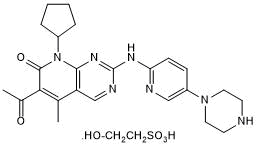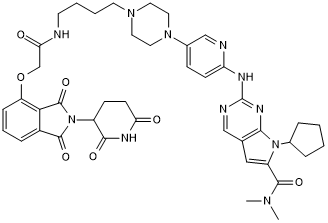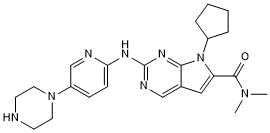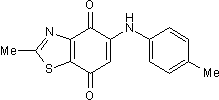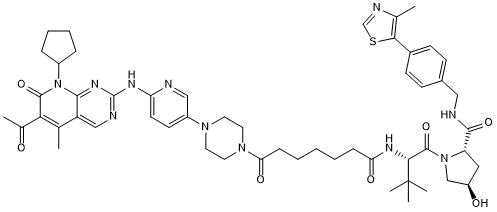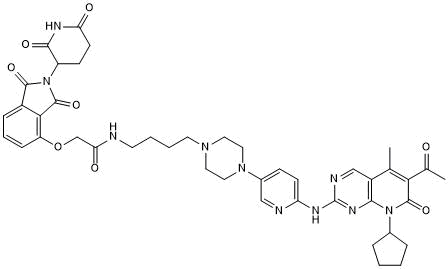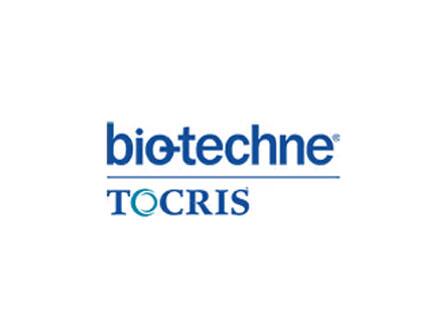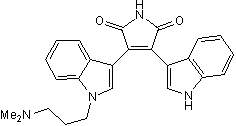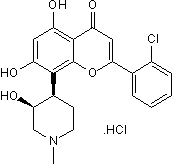CDK4: Small Molecules and Peptides
Cyclin-dependent Kinase 4 (CDK4) is a 303 amino acid (aa) member of the Ser/Thr kinase family with a predicted molecular weight of 33.7 kDa. The human protein shares 94% and 95% aa sequence identity with the mouse and rat orthologs, respectively. CDK4 shuttles between the cytoplasm and nucleus as part of its role in cell cycle regulation. It promotes the transition from G1 to S phase by phosphorylating and inactivating RB1. Activation of CDK4 requires binding of a D-type Cyclin and phosphorylation of Thr172 by the CAK kinase complex. Calcineurin, a phosphatase enzyme, negatively regulates CDK4 by dephosphorylating Thr172. The CDK4/Cyclin D complex is also negatively regulated by p21/CIP1/CDKN1A and p27/Kip1. Loss of both CDK4 and CDK2 increases neural stem cell differentiation. CDK4 inhibition decreases homologous recombination and increases non-homologous end joining, suggesting that CDK4 may also promote error free DNA repair. CDK4 also likely plays a significant role in cancer. CDK4 may be useful as a prognostic marker for hepatocellular carcinoma and its kinase activity has been reported to promote the progression of T cell acute lymphoblastic leukemia.
13 results for "CDK4 Small Molecules and Peptides" in Products
13 results for "CDK4 Small Molecules and Peptides" in Products
CDK4: Small Molecules and Peptides
Cyclin-dependent Kinase 4 (CDK4) is a 303 amino acid (aa) member of the Ser/Thr kinase family with a predicted molecular weight of 33.7 kDa. The human protein shares 94% and 95% aa sequence identity with the mouse and rat orthologs, respectively. CDK4 shuttles between the cytoplasm and nucleus as part of its role in cell cycle regulation. It promotes the transition from G1 to S phase by phosphorylating and inactivating RB1. Activation of CDK4 requires binding of a D-type Cyclin and phosphorylation of Thr172 by the CAK kinase complex. Calcineurin, a phosphatase enzyme, negatively regulates CDK4 by dephosphorylating Thr172. The CDK4/Cyclin D complex is also negatively regulated by p21/CIP1/CDKN1A and p27/Kip1. Loss of both CDK4 and CDK2 increases neural stem cell differentiation. CDK4 inhibition decreases homologous recombination and increases non-homologous end joining, suggesting that CDK4 may also promote error free DNA repair. CDK4 also likely plays a significant role in cancer. CDK4 may be useful as a prognostic marker for hepatocellular carcinoma and its kinase activity has been reported to promote the progression of T cell acute lymphoblastic leukemia.
Potent cdk4 and cdk6 inhibitor; brain penetrant
| Alternate Names: | Palbociclib |
| Chemical Name: | 6-acetyl-8-cyclopentyl-5-methyl-2-[[5-(1-piperazinyl)-2-pyridinyl]amino]pyrido[2,3-d]pyrimidin-7(8H)-one isethionate salt |
| Purity: | ≥98% (HPLC) |
Selective Cdk4 Degrader (PROTAC®)
| Chemical Name: | 7-Cyclopentyl-2-[[5-[4-[4-[2-[[2-(2,6-dioxopiperidin-3-yl)-1,3-dioxoisoindolin-4-yl]oxy]acetamido]butyl]piperazin-1-yl]pyridin-2-yl]amino]-N,N-dimethyl-7H-pyrrolo[2,3d]pyrimidine-6-carboxamide |
| Purity: | ≥98% (HPLC) |
Dual cdk4/cdk6 inhibitor; orally bioavailable
| Alternate Names: | LEE-011 |
| Chemical Name: | 7-Cyclopentyl-N,N-dimethyl-2-[[5-(1-piperazinyl)-2-pyridinyl]amino]-7H-pyrrolo[2,3-d]pyrimidine-6-carboxamide |
| Purity: | ≥98% (HPLC) |
SETD8 inhibitor; also CDK4 inhibitor
| Chemical Name: | 2-Methyl-5-[(4-methylphenyl)amino]-4,7-benzothiazoledione |
| Purity: | ≥98% (HPLC) |
Cyclin D1, CDK4/6 and cyclin D3 Degrader (PROTAC®)
| Chemical Name: | (2S,4R)-1-((S)-2-(7-(4-(6-((6-Acetyl-8-cyclopentyl-5-methyl-7-oxo-7,8-dihydropyrido[2,3-d]pyrimidin-2-yl)amino)pyridin-3-yl)piperazin-1-yl)-7-oxoheptanamido)-3,3-dimethylbutanoyl)-4-hydroxy-N-(4-(4-methylthiazol-5-yl)benzyl)pyrrolidine-2-carboxamide |
| Purity: | ≥98% (HPLC) |
Selective Cdk4/6 Degrader (PROTAC®
| Chemical Name: | N-[4-[4-[6-[(6-Acetyl-8-cyclopentyl-7,8-dihydro-5-methyl-7-oxopyrido[2,3-d]pyrimidin-2-yl)amino]-3-pyridinyl]-1-piperazinyl]butyl]-2-[[2-(2,6-dioxo-3-piperidinyl)-2,3-dihydro-1,3-dioxo-1H-isoindol-4-yl]oxy]acetamide |
| Purity: | ≥98% (HPLC) |
CDK6 and CDK4 HSP90-mediated targeting chimera (HEMTAC) Degrader
| Chemical Name: | 4-[6-[(6-Acetyl-8-cyclopentyl-7,8-dihydro-5-methyl-7-oxopyrido[2,3-d]pyrimidin-2-yl)amino]-3-pyridinyl]-N-[[1-[4-[2-amino-4-chloro-7-[(4-methoxy-3,5-dimethyl-2-pyridinyl)methyl]-7H-pyrrolo[2,3-d]pyrimidin-5-yl]-3-butyn-1-yl]-1H-1,2,3-triazol-4-yl]methyl]-1-piperazineacetamide |
| Purity: | ≥95% (HPLC) |
Protein kinase C inhibitor
| Alternate Names: | Gö 6850,Bisindolylmaleimide I |
| Chemical Name: | 2-[1-(3-Dimethylaminopropyl)indol-3-yl]-3-(indol-3-yl) maleimide |
| Purity: | ≥98% (HPLC) |
Cdk inhibitor; potently inhibits cdk1, 2, 5 and 9
| Chemical Name: | 4-[2-Methyl-1-(1-methylethyl)-1H-imidazol-5-yl]-N-[4-(methylsulfonyl)phenyl]-2-pyrimidinamine |
| Purity: | ≥98% (HPLC) |
HMG-CoA reductase inhibitor
| Chemical Name: | (1S,3R,7S,8S,8aR)-1,2,3,7,8,8a-Hexahydro-3,7-dimethyl-8-[2-[(2R,4R)-tetrahydro-4-hydroxy-6-oxo-2H-pyran-2-yl]ethyl]-1-naphthalenyly-2,2-dimethyl butanoate |
| Purity: | ≥98% (HPLC) |
Potent and selective cdk inhibitor; orally bioavailable
| Chemical Name: | [4-Amino-2-[[1-(methylsulfonyl)-4-piperidinyl]amino]-5-pyrimidinyl](2,3-difluoro-6-methoxyphenyl)methanone |
| Purity: | ≥98% (HPLC) |
Potent HMG-CoA reductase inhibitor
| Alternate Names: | Mevinolin |
| Chemical Name: | (2S)-(1S,3R,7S,8S,8aR)-1,2,3,7,8,8a-Hexahydro-3,7-dimethyl-8-[2-[(2R,4R)-tetrahydro-4-hydroxy-6-oxo-2H-pyran-2-yl]ethyl]-1-naphthalenyl-2-methyl butanoate |
| Purity: | ≥97% (HPLC) |
Cdk inhibitor; potently inhibits cdk2 and cdk9
| Alternate Names: | L 86-8275 |
| Chemical Name: | 2-(2-Chlorophenyl)-5,7-dihydroxy-8-[(3S,4R)-3-hydroxy-1-methyl-4-piperidinyl]-4H-1-benzopyran-4-one hydrochloride |
| Purity: | ≥98% (HPLC) |

